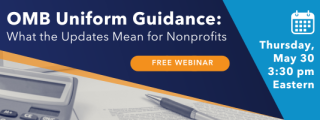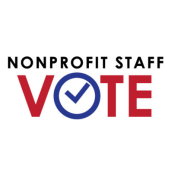Free Nationwide Nonprofit Webinar

OMB Uniform Guidance: What the Updates Mean for Nonprofits
Thursday, May 30 from 3:30 – 4:30pm Eastern
Last month, the federal Office of Management and Budget (OMB) released a major rewrite of the Uniform Guidance that is exceedingly supportive of charitable nonprofits. The new revisions address longstanding problems in covering nonprofits’ actual costs, advance equity by making grants accessible to more organizations and communities, and make other significant reforms that will reduce bureaucratic barriers and burdens and costs of seeking, performing, and reporting on grants involving federal funds.
Learn how the reforms will directly benefit your charitable organization by joining a special, nationwide free webinar, OMB Uniform Guidance: What the Updates Mean for Nonprofits, on Thursday, May 30 at 3:30 – 4:30 pm Eastern.
Closing Loopholes or Scapegoating Charitable Nonprofits?
Last week, in the name of closing loopholes that allegedly allow foreign interests to interfere with American elections, the House Ways and Means Committee took up several bills related to contributions to charitable nonprofits and how they are reported. The following are some of the five bills voted out of Committee and sent to the House floor for future consideration:
- H.R. 8291, the “End Zuckerbucks Act”: Prohibits charitable organizations from providing funding for election administration to states and localities. See Committee’s summary. Half the states have already enacted similar bans, ostensibly to protect the ballot process from outside interference. The concern is how the measure could infringe on nonpartisan election-related activities such as voter registration and get out the vote efforts.
- H.R. 8293, the “American Donor Privacy and Foreign Funding Transparency Act”: Restricts most federal entities from collecting or releasing information about donors to tax-exempt organizations, yet requires the Department of the Treasury to make public information relating to gifts and contributions received from foreign sources. See Committee’s summary. Numerous concerns arise. The bill would impose a donor secrecy mandate that would hinder legitimate law enforcement efforts to root out corruption and disrupt dark money in politics. The bill does include exceptions for the IRS, Congress, and FEC for enforcing lobbying and elections laws, and pursuant to court orders. It also significantly increases penalties for disclosing confidential information, imposing fines up to $250,000 and 5 years in prison.
- H.R. 8290, the “Foreign Grant Reporting Act”: Public disclosure on Form 990s of grants made by charitable nonprofits and other organizations to foreign entities, including indirect contributions. See Committee’s summary. The concern is that public disclosures could subject recipients to danger in troubled parts of the world.
Worth Studying
- Ways and Means Advances Solutions to Protect Election Integrity, Fight Foreign Money in American Politics, House Ways and Means Republican office, May 16, 2024.
- New Bills Raise Concerns for Philanthropy, Council on Foundations, May 17, 2024.
Commentary
Charitable Nonprofits Transcend Politics. Period.
Elected officials have a long history, particularly during election years, of turning against charitable nonprofits by assuming that actions not aligning with their party's platform or orthodoxy must be motivated by nothing other than partisan, political thinking. Much of the rhetoric of the majority in the House Ways and Means Committee appears to reflect this mindset. It may be a sincerely held presumption of politicians and their operatives – i.e., you’re either for us or against us. But that mindset is not, and cannot be allowed to become, the standard or even common perspective of any person who is committed to a charitable nonprofit’s mission. In short, mission transcends politics. This is a fact long reinforced by the law in Section 501(c)(3). We made this point in a statement to House politicians last fall who alleged that nefarious and partisan charities and their donors were running rampant throughout the American election system. We wrote this then, and repeat it:
Nonpartisan, Now and Forever: There must be no doubt about the position of the charitable nonprofit community. The overwhelming majority of 501(c)(3) organizations – frontline charities, churches, and foundations – are nonpartisan in law, fact, and culture, and are committed to remaining that way to ensure their integrity and impact.
Worth Reading
- Response of the National Council of Nonprofits to House Ways and Means Request for Information, National Council of Nonprofits, submitted Sept. 5, 2023.
Federal FastView
- Attempt to Change State and Local Fiscal Recovery Funds (SLFRF) Guidance: Last week, the U.S. Senate rejected an attempt to block a change in the definition of “obligation” under the SLFRF program created by the American Rescue Plan Act. The 46-49 vote defeated a joint resolution introduced by Senator Eric Schmitt (R-MO) that would have cancelled the guidance the U.S. Department of the Treasury's guidance issued in November 2023 giving state and local governments more flexibility with reporting and compliance requirements. The White House released a statement opposing the joint resolution, stating that changing the law now would create “unnecessary uncertainty for recipients that are executing on projects, jeopardize important work underway, and inappropriately constrain Treasury’s ability to address ongoing implementation issues.” As discussed in this related article, governments must obligate all remaining SLFRF resources by the end of this year.
- Supporting Local Nonprofit Theaters: This spring, four Democratic Senators introduced the Supporting Theater and the Arts to Galvanize the Economy (STAGE) Act in response to post-covid challenges local nonprofit theaters continue to face. The bill would establish a Professional Nonprofit Theater Grant Program to provide $1 billion annually in grants that could go towards rent, payroll, workforce development, and other expenses to attract new audiences. The legislation also calls for a “study on sustaining the nonprofit arts sector.” In a statement, Senator Welch (D-VT) noted that “post-pandemic, nonprofit theaters in Vermont and across America have struggled to keep the marquee lit. The STAGE Act is an investment in our communities, in jobs, and in our local economy.”
- Loan Consolidation Deadline Extended to June 30: The Biden Administration has extended the deadline for borrowers with outstanding Family Federal Education Loans (FFEL) loans, including parents with Parent PLUS loans, to consolidate them into a Direct Loan. The added time can be of great benefit to many borrowers because currently FFEL loans do not qualify for Public Service Loan Forgiveness (PSLF) but Direct Loans do. The Administration also announced that the count adjustment is expected to be fully implemented in September of this year, which will allow borrowers to “see a full and accurate count of their progress toward loan forgiveness.” Borrowers can receive credit toward PSLF for any month covered by the payment count if they meet employment requirements. Learn more about how and why consolidation helps PSLF borrowers and how to maximize benefits under the program.
- Census Bureau Questions on Sexual Orientation and Gender Identity: The U.S. Census Bureau announced it is seeking comments on its proposed testing of questions related to sexual orientation and gender identity on the American Community Survey. The list of questions would apply to people in a household “15 years of age or older,” and ask about assigned sex at birth and current gender identity, as well as sexual orientation. According to the Census Bureau, it is proposing to evaluate these questions to “meet the needs of other federal agencies that have expressed interest in or have identified legal uses for the information, such as enforcing civil rights and equal employment measures.” Because the questions are being tested, they will not be official federal statistics. The public is invited to submit comments by May 30, 2024.
Election Tip
Giving Your Staff Time Off to Vote

Join the Nonprofit Staff Vote campaign to encourage nonprofit employees paid time off to vote on or before Election Day. Inability to take time off from work can be a barrier for potential voters. Nonprofits can make a difference by leading with policies that ensure all employees have access to the ballot box. Create a policy, share it with employees, and publicize election and registration deadlines, to help lead the way. Learn how and see sample policies at Nonprofit Staff Vote.
Worth Reading
- Why Redistricting Lawsuits Never Stop, Adam Kincaid, Governing, Spring 2024.
State Regulatory Changes Affecting Nonprofit Operations
- Charitable Fundraising Platforms: In response to the devastating fires on Maui, legislators in Hawai`i passed a bill to authorize the Attorney General to regulate charitable fundraising platforms. The legislation would, among other things, require charitable fundraising platforms to register prior to soliciting, permitting, or otherwise enabling solicitations for charitable purposes, require disclosures to prevent deception, confusion, or misunderstanding to donors, and secure written consent of recipient charitable organizations before using its name for solicitation. The bill awaits the Governor’s signature.
- Data Privacy: The Vermont Legislature passed and sent to the Governor for his consideration a bill to create consumer data protections. The final bill establishes data privacy requirements for data collectors of personal information, including nonprofits, and provides rights to consumers to opt out of processing personal information. Specifically, the measure prohibits the sale of sensitive data, such as Social Security and driver’s license numbers, financial, and health information. It also sets limits on the amount of personal data that companies can collect and use. There are eligibility thresholds in the bill to reduce its impact on smaller organizations, but the Governor’s signature is uncertain due to his stated concern for small businesses. The Legislature in Maine adjourned this month without passing its version of data privacy legislation.
- Donor Secrecy: Georgia Governor Kemp signed the Personal Privacy Protection Act, which prohibits any public agency from requiring an individual, nonprofit, or contractor to provide to the government any information that directly or indirectly identifies a person as a member, supporter, volunteer, or donor to a nonprofit. Unlike versions enacted in other states, the Georgia measure provides important exemptions for, among others, application to disclosures under the Georgia Charitable Solicitations Act, filings required for tax administration, regulatory oversight by the Department of Banking and Finance and other oversight by government agencies, collection and use permitted for administration of programs and services, and compliance by prospective and approved contractors, or under the Department of Health.
State Tax Changes Affecting Nonprofit Tax Exemptions
Every year, legislatures consider adjusting sales and property tax exemptions affecting charitable nonprofits. 2024 is no different.
- Sales Tax Exemption: Maine Governor Mills recently signed the state’s supplemental budget that includes a provision exempting 501(c)(3) nonprofits from sales taxes on purchases of property or services used primarily for the purpose for which the organization was organized. The Maine Association of Nonprofits lauded the reform, stating, “Hundreds of nonprofit organizations raised their voices to express the need for this legislation, which will fix the very confusing and arbitrary set of current exemptions.”
- Property Tax: A provision added to a Minnesota tax bill seeks to remove property tax exemptions of rental housing property of charitable nonprofits unless the properties’ use is in the furtherance of the tax-exempt purpose and does not further the charitable purpose solely by providing rental housing to persons or families based on income. Similarly, a new law in Mississippi removes the property tax exemption for nonprofit foundations that support higher education from property leased or otherwise used to generate revenue that is not used exclusively to benefit the higher education institution.
Numbers in the News
70%
The percentage of individuals with CEO or executive director positions who identify as White, according to a report looking at the diversity of the nonprofit workforce broken down by roles: CEO, Board, Senior Staff, and Staff. Additional demographic findings on nonprofit CEOs include gender (62% female), sexual orientation (9% LGBTQIA+), and disability status (11%).
Source: The state of diversity in the U.S. nonprofit sector, Candid, May 16, 2024. The stated purpose of the report was to 1) “increase transparency about diversity in the sector,” 2) “highlight key findings about the demographics of the sector at the macro level,” and 3) “offer funders, nonprofits, and analysts a snapshot and baseline for demographics in the sector in order to better track our collective progress toward diversity, equity, and inclusion.”
$89 billion
The estimated amount of State and Local Fiscal Recovery Funds still available for grantmaking to charitable nonprofits and others under the American Rescue Plan Act, as of Dec. 31, 2023.
Source: State and Local Fiscal Recovery Funds: Nonprofit Projects through December 31, 2023, Jessica Mendieta, National Council of Nonprofits blog, Apr. 22, 2024. For more information about securing SLFRF funds before it’s too late, see State and Local Fiscal Recovery Funds Still Available for the Asking. So Ask!
Taking Notice

Effective May 11, Minnesota has a new state flag. The new one has an eight-pointed white star in a dark blue abstract shape of Minnesota on the left and a field of light blue on the right, reportedly evoking imagery of the state’s waters, as well as the state motto: L’Étoile du Nord, French for “Star of the North.” Read more.
Nonprofit Events
- May 22, Advocacy in Action, The Foraker Group (Alaska).
- May 22, Rally for Nonprofits, Delaware Alliance for Nonprofit Advancement.
- May 22, 12th Annual Caring Force Rally, Providers’ Council (Massachusetts).
- May 29-30, NDANO 2024 Nonprofit Leadership Conference, North Dakota Association of Nonprofit Organizations.
- May 31, Advocacy Roundtable, Oklahoma Center for Nonprofits.
- June 3, Progress through Advocacy, Pennsylvania Association of Nonprofit Organizations.
State and Local Fiscal Recovery Funds Still Available for the Asking. So Ask!
Our Advocacy in Action articles normally feature nonprofits advancing their missions in innovative ways using advocacy in the broadest sense of the word. Their examples often inspire other nonprofits to engage in advocacy in their own creative ways. This article diverges from the norm. It is less inspiration (although imbued with brilliance of nonprofit colleagues across the country), and more of a hands-on guide on how to advocate with local and state officials to secure what’s remaining of quickly disappearing funding. It’s time to set aside theory and inspiration and get to The Ask for State and Local Fiscal Recovery Funds (SLFRF) under the American Rescue Plan Act (ARPA).
Stay in the Loop
Want to be the first to know policy developments and operational trends affecting nonprofits? Sign-up to receive our free newsletters, Nonprofit Champion and Nonprofit Essentials, and browse the archive of past editions.
Sign-up